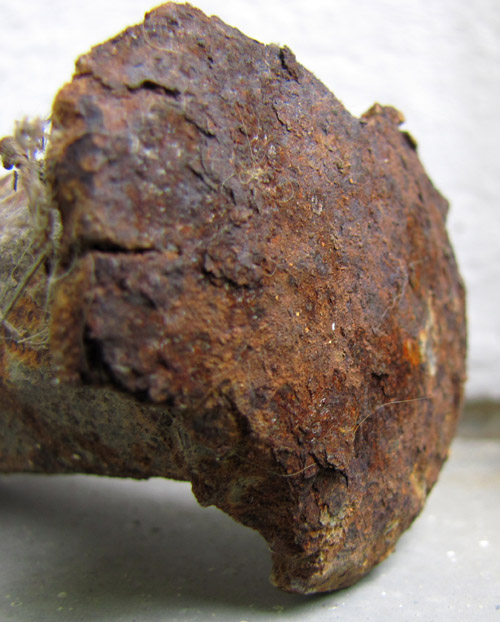 “That, son, is the unluckiest man in the world.” Bill nodded toward the foreman passing down the shop floor for the fiftieth time that day. The summer before starting grad school, I’d landed a factory job where he and I spent all day rolling towering racks of plywood in and out of a kiln hotter than Dante’s eighth ring, laminating wood to be cut, shaped, and polished for handles to Ecko paring knives.
“That, son, is the unluckiest man in the world.” Bill nodded toward the foreman passing down the shop floor for the fiftieth time that day. The summer before starting grad school, I’d landed a factory job where he and I spent all day rolling towering racks of plywood in and out of a kiln hotter than Dante’s eighth ring, laminating wood to be cut, shaped, and polished for handles to Ecko paring knives.
The foreman—I’ll call him Alouicious—was a dour man, with a face like he’d been baked in one of those kilns—leathery, road mapped with wrinkles and scars like the hired hand I’d known back on our Minnesota farm who’d fallen off his tractor and been run over by a disk. Even on the eighth ring’s hottest summer days, Alouicious wore a flannel shirt under his overalls, and he walked with this swaying, stiff-legged, cob-up-the-ass gait, barely glancing up from the clipboard perpetually nestled in the crook of his arm. In his presence, I made as if I were eager to please, but after he’d pass by, I’d delight the other workers by mocking his walk. An outsider trying to belong.
Bill, a hulking factory vet with a wild black beard, never joined in the laughter. That day, trying to draw him into the game, I’d asked, “You think he really does have a cob up his ass?”—grinning the grin of a smart-ass college kid who’d be gone by September.
His expression turned rueful as he gave his reply, and I couldn’t help but ask, “What do you mean ‘unlucky’?”
Bill peeked around the rack, making sure that Alouicious was out of earshot. “Back in the Thirties,” he began, “he and his girlfriend was double-dating, riding the rumble seat of his buddy’s jalopy over the mountain after drinking till late. Rounding a bend, this other car hits them head-on. Throws everyone out, and it’s a hell of a mess. Guy passing by calls the cops, who get a hearse to take what’s left of the bodies to a morgue. Next day, couple kids nosing around the wreck hear moaning overhead, look up, and there’s Alouicious hanging in the branches. Ambulance comes, they get him down, and he’s in the hospital for months. Broke every bone in his body.”
“Jesus!” I breathed. “So that’s why he walks that way?”
“Not only.” Another peek around the rack. “Come the Fifties, after making foreman, Alouicious is one time up on the fourth floor taking inventory. Those days, the freight elevator was a mesh cage—no door, just a couple long paddles that swung out. Well, he’s eyes-down on his clipboard as he pushes through those paddles—only someone’d punched the button to send it to one. Next thing, the guy getting on down there hears him hit. BAM! Alouicious is sprawled on the mesh above his head, out cold. They take him off, and he’s trussed up in traction six months. Broke every bone all over again.”
Now, I’d studied folk tales. I know there’s a third part. So I don’t even ask.
“Then, just a few years ago, seems as how every morning, Alouicious’s got this ritual. Eat breakfast, grab the newspaper, and head into the can for his daily smoke and shit. Like clockwork. He’d plant himself, light a cigarette, and settle in to check out the Red Sox scores while doing his business. Well, he had an old, metal, flip-top lighter, see, kind you fill up with fluid? One day, he can’t find it, so he grabs a Blue Tip match instead. His grandkids are over, playing in the bathroom, so he chases them out, sits down, and lights his smoke. But seems the boys’d dumped his whole can of lighter fluid into the toilet, and when he goes to flip the burning match into the bowl—POOF!” Bill clapped his hands, and I jumped.
“Hate to ask.”
“Bad,” Bill said, rueful expression deep. “Lost every hair. Toasted his nuts. In the hospital another long time.” He paused. “Did quit smoking, though.”
Chastened, I went back to shouldering racks, sensing a lesson unlike any I’d ever learned from books. You don’t know Alouicious, Bill was saying. You don’t know what people have suffered, what they might be enduring every day of their lives. Don’t trust luck, and don’t waste time judging. Just do the work. Everything else will follow.
Were the stories true? It didn’t matter. Alouicious had survived, and I was still learning how.
—
Randall Albers chairs the Fiction Writing Department at Columbia College Chicago, is Founding Producer of the Story Week Festival of Writers, and is a former winner of the Columbia College Teaching Excellence Award. His fiction and nonfiction have appeared in Writing in Education, Prairie Schooner, Chicago Review, F Magazine, TriQuarterly, Briefly Knocked Unconscious by a Low-Flying Duck, and elsewhere.

5 comments
Mort Castle says:
May 15, 2013
Good stuff.
Duffer says:
May 15, 2013
Great reminder for everyone’s cob-in-the-ass gait.
Wanetta Johnson says:
Jan 19, 2014
Good story. Great ending. Good plot.
Ron Hayes says:
Apr 15, 2014
Not to be a jerk, but Dante’s ninth circle is characterized not by fire and heat, but ice and cold, to symbolize the absence of God’s love and the attendant warmth found there. Minor detail, surely, but an important one.
Dinty says:
Apr 25, 2014
Fixed. Thanks.